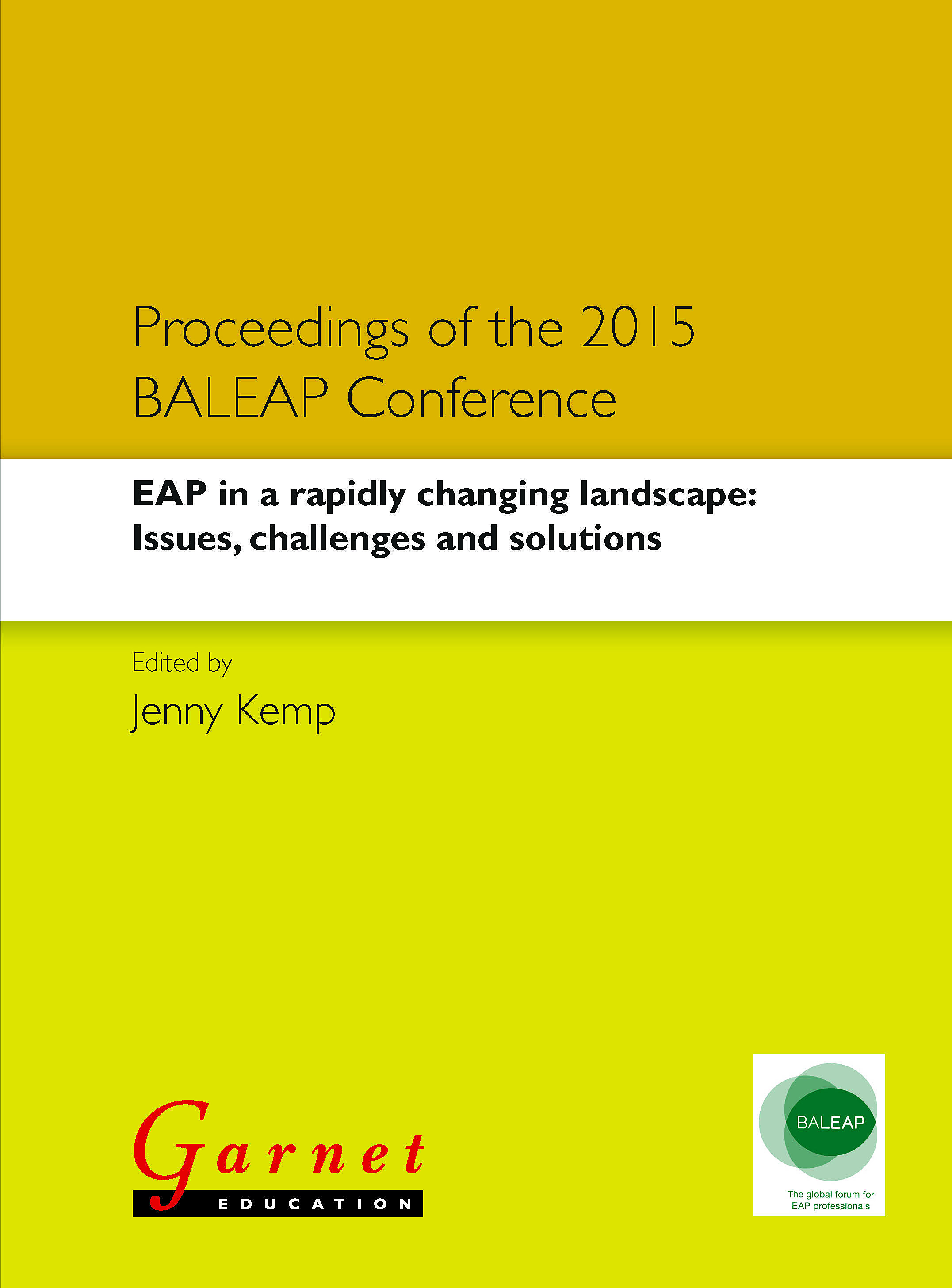About the book
EAP in a rapidly changing landscape: Issues, challenges and solutions
This volume contains a selection of papers from the Biennial BALEAP Conference held at Leicester University, UK, in April 2015. The conference drew delegates from more than a dozen countries and this collection reports on EAP teaching and research in contexts as geographically diverse as Bangladesh, Canada, Hong Kong and the United Arab Emirates.
The conference theme was EAP in a rapidly changing landscape: Issues, challenges and solutions.This volume gives an insight into the current state of EAP through the prescribed and emergent themes. It is divided into four sections: Globalisation, acculturation, socialisation; Knowledge of ourselves and of our learners; Approaches to genre and discourse; and Achieving specificity. However, there are also other topics running through the volume, such as academic literacy, online delivery and the value of reflection. Whether you missed the conference or wish to recall some of the presentations you attended, this is a volume you should read.
In order to encourage continuing professional development and scholarly activity, this volume is accompanied by tasks on the BALEAP website that will encourage readers to develop their knowledge and explore their own practices.The tasks can be found here: https://www.baleap.org/accreditation/individuals/teap-resources. There is also a thematic index at www.baleap.org/resources.
BALEAP, the global forum for EAP professionals, supports the professional development of those involved in learning, teaching, scholarship and research in English for Academic Purposes (EAP).
Click here to read the introduction to the volume.
Contents
Section I: Globalisation, acculturation, socialisation
Navigation in a complex world: English as compass or map? – Rebecca Hughes
Encouraging mindful learning and academic self-development in EAP: Framing reflection as an integral part of a pre-sessional EAP curriculum – Irina Veleanu and Simon Gooch
Perspectives on presenting: Using a student conference to help develop academic literacies – Simon Gooch and Elaine Smith
Designing and delivering pre-sessional online – Blair Matthews
Evaluating an online course to improve students’ academic readiness for UK pre-sessional study: A pilot study – Julie Watson
Section II: Knowledge of ourselves and of our learners
The E(A)P of spelling: Using Exploratory Practice to (re)engage teachers and students – Bee Bond
Cognitive modelling: Think aloud as an expert while teaching – Maggie Heeney
Cognitive theory and task-based competence – Dina Awad
Digitising the EAP classroom: Making the VLE more active – Zoe Gazeley-Eke
Extrinsically motivated homework behaviour: Student voices from the Arabian Gulf – Mehtap Kocatepe
Section III: Approaches to genre and discourse
Waves of reflection: Seeing knowledges in academic writing – Steve Kirk
Applying linguistics in TEAP:The case of student reports – Sheena Gardner
How representative are EAP listening books of real lectures? – Katrien L.B.Deroey
Teaching figurative language in an English for Academic Purposes classroom – Olga Burakov
Feedback on feedback: The role of ESAP tutor feedback in improving postgraduate student academic writing ability – Jill Northcott, Pauline Gillies and David Caulton
The literature review as an integrated EAP/disciplines assessment – Simon G.J.Smith and Christopher J.M.Smith
Section IV: Achieving specificity
Innovating instruction: Specificity and English in the disciplines – Ken Hyland
An evaluation of an online, in-sessional English for Legal Studies course in Bangladesh – David Donnarumma and Emma Blyth
Joined-up ESAP: Drawing on in-sessional provision to establish an ESAP pre-sessional programme – Anne Heaton, Andrew Preshous and Simon Smith
Exploiting corpora to address the subject-specific vocabulary needs of students – Andrew Preshous and Jenny Kemp
Author details
Jenny Kemp is a lecturer in EAP at Leicester University, where her current roles include directing a pre-sessional, providing in-sessional Law support and encouraging professional development. She is a Senior Fellow of BALEAP and of the Higher Education Academy, and a Mentor and Assessor for the TEAP Scheme. Her main research interests lie in discipline-specific vocabulary and the use of corpora in teaching and learning.
Reviews
'It is essential that theory and practice inform one another. This collection demonstrates that this is achievable by us all.'
Diane Schmitt, Chair of BALEAP 2013–2016



